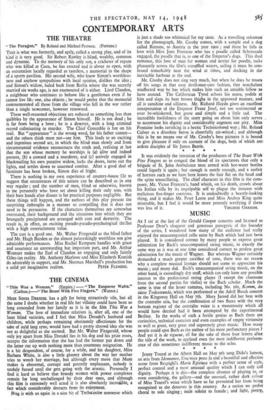CONTEMPORARY ARTS
THE THEATRE
The Paragon." By Roland and Michael Pertwee. (Fortune.) Tins is what was formerly, and aptly, called a strong play, and of its kind it is very good. Sir Robert Rawley is blind, wealthy, common and dynamic. To the memory of his only son, a cricketer of repute who was killed at Caen, he has erected and is about to open, with an ostentation locally regarded as tasteless, a memorial in the shape of a sports pavilion. His second wife, who knew Simon's worthless- ness and anyhow sympathises with local opinion, dislikes the idea ; and Simon's widow, haled back from Berlin where she was secretly married six weeks ago, is not enamoured of it either. Cord Clandon, a neighbour who continues to behave like a gentleman even if he
cannot live lik, one, also objects; would prefer that the memorial commemorated all those from the village who fell, in the war rather than a single newcomer, however renowned.
These well-reasoned objections are reduced to something less than quibbles by the appearance of Simon himself. He is not dead; is far from being a hero • he is a deserter with a long criminal record culminating in murder. The Chief &mstable is hot on his trail. But " appearance " is the wrong word, for his father cannot— and the others think must not—see him. This leads to an exciting and ingenious second act, in which the blind man slowly and from circumstantial evidence reconstructs the truth and, realising at last that the son whose memory he worships is (a) alive and indeed present, (b) a coward and a murderer, and (c) actively engaged in blackmailing his own putative widow, locks the doors, turns out the lights, and settles down to unarmed combat. After a good deal of furniture has ,been broken, Simon dies of fright.
There is nothing in my own experience of country-house life to suggest that occurrences of this nature can be described as in any way regular ; and the number of men, blind or otherwise, known to me personally who have set about killing their only sons with their bare hands after dinner is for practical purposes negligible. But these things will happen, and the authors of this play present the surprising imbroglio in a manner so compelling that it does not need to be persuasive. If the characters themselves are somewhat overstated, their background and the situations into which they are brusquely precipitated are arranged with care and dexterity. The result is, in effect, an exciting pseudo-pseudo-psychological thriller with a high entertainment value.
The cast is a good one. Mr. Walter Fitzgerald as the blind father and Mr. Hugh Burden as the almost painstakingly worthless son give admirable performances. Miss Rachel Kempson handles with grace and assurance an unrewarding but important part, and Mr. Arthur Wontner makes the Earl of Clandon an engaging and only faintly Giles-ian reality. Mr. Anthony Marlowe and Miss Elizabeth Kentish do admirably in support, and Mr. Norman Marshall's production has






























 Previous page
Previous page